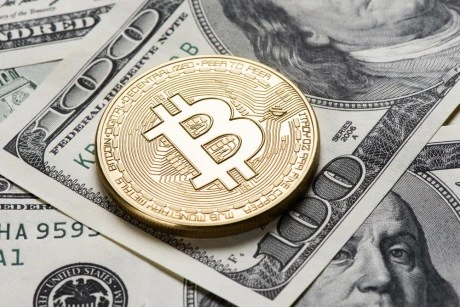US Bitcoin reserve vs. gold and oil reserves: How do they compare?
US reserves status quo: Gold, oil and the emerging role of Bitcoin
The US government has long relied on gold and oil as reserve assets, but with the growing institutional adoption of Bitcoin (BTC), its potential role as a strategic reserve has increased substantially. This possibility and potential of the Bitcoin strategic reserve have seen a major tailwind as the new administration took charge in the US in January 2025.
While gold has historically backed monetary systems and oil remains a key economic and security asset, Bitcoin represents a new kind of digital reserve that challenges traditional financial paradigms.
The United States holds substantial reserves in gold and oil, but its Bitcoin holdings are comparatively small and primarily acquired through asset seizures. As of the third quarter of 2024, the US holds approximately 8,133.46 metric tons of gold, valued at around $789. 87 billion (on March 8, 2025), making it the largest sovereign holder of gold reserves.
These reserves have historically been used as a hedge against economic uncertainty and to back the dollar before the gold standard was abandoned in 1971.
In the case of oil, the US maintains a Strategic Petroleum Reserve (SPR), which, as of August 2024, holds around 372 million barrels. The SPR was established in the 1970s in response to the oil crisis and is valued at approximately $28 billion at current market prices. These reserves manage supply disruptions, control inflationary pressures, and stabilize energy markets during geopolitical crises.
Bitcoin, unlike gold and oil, is not an official reserve asset, but the US government possesses a significant amount through confiscations. Estimates suggest the government controls roughly 200,000 BTC, worth around $15.90 billion at a Bitcoin price of $79,515 (as of March 10).
However, unlike gold and oil, these holdings are not stored as strategic reserves but rather as assets pending auction or liquidation by the Department of Justice and the US Marshals Service.
Liquidity and market dynamics of gold, oil and Bitcoin
Gold, oil and Bitcoin each exhibit unique liquidity and market dynamics, with gold being the stablest, oil driven by geopolitical factors and Bitcoin characterized by high volatility and 24/7 accessibility.
The depth of liquidity of an asset in a market is an extremely important indicator of the asset’s health. Typically, the higher the liquidity, the better the options investors have around pricing and risk management.
Let’s understand how gold, oil and Bitcoin differ from each other in terms of liquidity and market dynamics:
- Gold: It remains one of the most liquid financial assets, with daily trading volumes exceeding $200 billion across futures markets, exchange-traded funds (ETFs) and over-the-counter (OTC) trades. Its deep liquidity and universal recognition make it a preferred asset for central banks, institutional investors and governments looking to hedge against inflation and currency fluctuations. While gold’s price varies, it has historically maintained lower volatility than most other assets.
- Oil: It is traded at immense volumes in both spot and futures markets, with daily future volumes reaching about 1 million barrels globally. Unlike gold, oil’s liquidity is largely tied to its industrial demand and geopolitical developments. The price of oil is highly sensitive to supply chain disruptions, the Organization of the Petroleum Exporting Countries (OPEC) decisions and macroeconomic policies. Given its role in energy markets, oil volatility is much higher than gold, with price swings that can result from political instability, production cuts or major conflicts.
- Bitcoin: Bitcoin, despite being a relatively new asset, is highly liquid, with daily trading volumes often exceeding $30 billion–$50 billion across global exchanges. While BTC has gained legitimacy among institutional investors, it remains significantly more volatile than gold and oil due to speculative demand, regulatory uncertainty and market structure. Unlike gold and oil, Bitcoin operates on a 24/7 trading cycle, making it unique in terms of accessibility and global liquidity.
Storage and security concerns are crucial for any reserve asset, with each asset presenting unique challenges and costs.
- Gold: It is typically stored in highly secure facilities such as Fort Knox, the Federal Reserve Bank of New York and other vaults worldwide. The cost of storing gold varies, but large-scale sovereign reserves require substantial security infrastructure, transportation costs and insurance. Additionally, physical gold is vulnerable to theft and requires constant auditing to ensure authenticity and weight accuracy. Plus, custody fees for institutions storing gold in vaults range from 0.10% to 0.50% per year, depending on the storage provider.
- Oil: Unlike gold and Bitcoin, oil presents logistical challenges as it must be stored in underground salt caverns, refineries or tanker fleets. The cost of maintaining the Strategic Petroleum Reserve requires billions of dollars in infrastructure, maintenance and security. Moreover, oil storage is subject to depreciation due to environmental conditions, evaporation and contamination risks, making it more expensive to maintain than gold or Bitcoin.
- Bitcoin: Bitcoin storage differs fundamentally, as it is a digital asset. Governments and institutions typically use cold storage wallets and multisignature security to protect their holdings. While Bitcoin custody does not require physical storage facilities, cybersecurity risks such as hacking, private key mismanagement and regulatory oversight present major challenges. Institutional-grade custody solutions like BitGo, Fireblocks and Coinbase Custody charge anywhere from 0.05% to 0.25% per year, significantly lower than gold storage costs. However, the irreversibility of Bitcoin transactions increases the risks associated with mismanagement or unauthorized access.
Gold, oil and Bitcoin each play strategic roles in global economics, with gold as a hedge, oil influencing geopolitical stability, and Bitcoin emerging as a decentralized asset for inflation protection.
All of these assets have gained strategic and macroeconomic significance over time. Their narrative with relevance to the broader capital markets is perhaps what is needed to drive investors’ interest.
- Gold: Gold’s strategic role in the global economy dates back thousands of years, serving as a universal store of value and a medium of exchange. The US formally tied its currency to gold in the Bretton Woods system (1944–1971), which established the dollar as the world’s reserve currency backed by gold. Even after the US abandoned the gold standard in 1971, gold remained a key strategic asset held by central banks worldwide as a hedge against currency devaluation and inflation.
- Oil: It has evolved into an indispensable economic and security asset, with its price fluctuations directly impacting inflation, consumer spending and geopolitical stability. The formation of OPEC in 1960 and the subsequent oil crises in the 1970s demonstrated oil’s ability to drive inflation and shape economic policy. The petrodollar system, in which oil transactions are settled in US dollars, has further solidified oil’s role in global finance, ensuring sustained demand for the dollar and influencing US foreign policy.
- Bitcoin: BTC’s potential as a reserve asset lies in its decentralized nature, fixed supply (21 million BTC) and resistance to monetary debasement. Unlike gold and oil, which require extensive infrastructure, Bitcoin can be transferred globally in minutes and stored at near-zero cost.
As institutional adoption grows, Bitcoin’s strategic value as a hedge against inflation and government debt is increasingly recognized.
The future of US government’s Bitcoin policy
Policy moves suggest that the establishment of a strategic Bitcoin reserve could position it alongside traditional assets like gold and oil in the future.
In January 2025, President Donald Trump signed an executive order titled “Strengthening American Leadership in Digital Financial Technology,” establishing the Presidential Working Group on Digital Asset Markets to explore the creation of a national digital asset stockpile.
Building upon this initiative, on March 7, President Trump signed another executive order to create a “Strategic Bitcoin Reserve” and a “US Digital Asset Stockpile,” aiming to position the US as a leader in the cryptocurrency space. These reserves will be funded exclusively through cryptocurrencies seized during law enforcement operations, ensuring no taxpayer funds are utilized.
However, the reserve will be funded using cryptocurrencies already held by the government, primarily obtained through asset forfeitures rather than through new government purchases.
This strategy has had mixed reactions. While some view it as a positive step toward embracing digital assets, others express concern over the lack of new investments and the potential implications of using forfeited assets. As of March 10, 2025, Bitcoin’s value declined by more than 5% to approximately $79,515, reflecting market disappointment over the reserve’s funding approach.
Looking ahead, the US government’s Bitcoin policy is likely to continue evolving. The Presidential Working Group is expected to provide recommendations by July 2025, which could influence future regulatory frameworks, investment strategies and the integration of digital assets into the broader financial system.
As global interest in cryptocurrencies grows, the US may further refine its policies to balance innovation with security and economic stability alongside traditional assets such as gold and oil, which remain integral to the nation’s financial strategy.













